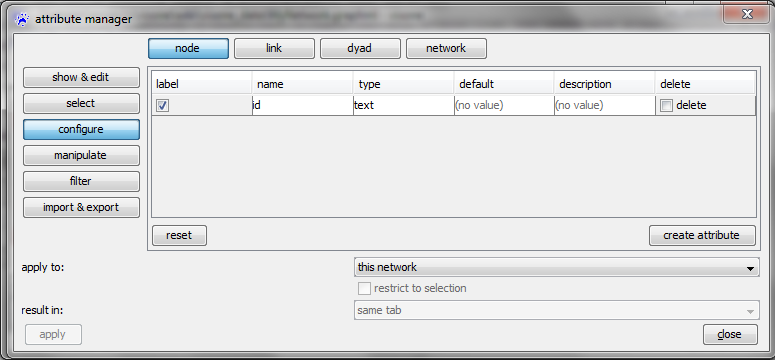Attribute manager: Difference between revisions
No edit summary |
No edit summary |
||
| Line 1: | Line 1: | ||
The attribute manager is started by clicking on its icon [[File:Attribute_manager.png|link=attribute_manager]] in visone's toolbar. | The attribute manager is started by clicking on its icon [[File:Attribute_manager.png|link=attribute_manager]] in visone's toolbar. | ||
As opposed to [[node_properties_dialog#attributes|node properties dialog]] and [[link_properties_dialog#attributes|link properties dialog]], that only allow to change the value of already existing attributes manually, the attribute manager provides a variety of possibilities related to the creation, configuration and automatical modification of attributes. | As opposed to the attributes tab of the [[node_properties_dialog#attributes|node properties dialog]] and [[link_properties_dialog#attributes|link properties dialog]], that only allow to change the value of already existing attributes manually, the attribute manager provides a variety of possibilities related to the creation, configuration and automatical modification of attributes. | ||
== categories == | == categories == | ||
| Line 21: | Line 21: | ||
* import & export management (automatically) | * import & export management (automatically) | ||
== manual modifications == | |||
Note, that attribute values are typically not added manually (which would be tiresome). It is more usual that attributes are [[#import_and_export|imported]] from files or computed by a [[anaylsis_tab|network analysis algorithm]]. | |||
=== configuration === | === configuration === | ||
| Line 29: | Line 33: | ||
* name field: enables the (re-)defintion of attribute names; to create a new attribute you have to use this field to define a name first | * name field: enables the (re-)defintion of attribute names; to create a new attribute you have to use this field to define a name first | ||
* type selection: defines the type (text, binary, integer, decimal, text list, integer list, decimal list) of the attribute | * type selection: defines the type (text, binary, integer, decimal, text list, integer list, decimal list) of the attribute | ||
* default: can be used to define a default value for this attribute that is assigned to all nodes automatically | * default: can be used to define a default value for this attribute that is assigned to all nodes automatically (since only declaring the name and type of an attribute function does not define its values) | ||
* description | * description | ||
Don't forget to press the apply button at the bottom of the attribute manager. | |||
==== dyad and network attributes ==== | ==== dyad and network attributes ==== | ||
| Line 39: | Line 45: | ||
=== values === | === values === | ||
The values category can be used to explore the values that the nodes/links (or the selected nodes/links, if there are selected nodes/links) assume on all attribute functions that are declared. You can also modify the values if the '''allow editing''' box at the bottom of the attribute manager is checked | The values category can be used to explore the values that the nodes/links (or the selected nodes/links, if there are selected nodes/links) assume on all attribute functions that are declared. You can also modify the values if the '''allow editing''' box at the bottom right of the attribute manager is checked. Additionally, you can specify whether to '''show default values''' (bottom left) and whether to display only a subset of attributes (use check marks at the top). | ||
Values that are ''not assigned'' yet, are marked with ''N/A''. | |||
== automatical modifications == | |||
=== operations === | |||
Revision as of 10:33, 16 December 2010
The attribute manager is started by clicking on its icon ![]() in visone's toolbar.
in visone's toolbar.
As opposed to the attributes tab of the node properties dialog and link properties dialog, that only allow to change the value of already existing attributes manually, the attribute manager provides a variety of possibilities related to the creation, configuration and automatical modification of attributes.
categories
There are 4 times 4 (2) selectable categories within the attribute manager, e.g. node attribute configuration:
The four radio buttons in the top line are used to select the kind of attribute one wants to manage, namely
- node attributes
- link attributes
- dyad attributes
- graph attributes
The four radio buttons on the left-hand side are used to specify what kind of management one is looking for, namely
- configuration management (manually)
- value management (manually)
- operation involving value management (automtically)
- import & export management (automatically)
manual modifications
Note, that attribute values are typically not added manually (which would be tiresome). It is more usual that attributes are imported from files or computed by a network analysis algorithm.
configuration
node and link attributes
- check mark: the check mark in the left column defines the attribute that is displayed as label
- name field: enables the (re-)defintion of attribute names; to create a new attribute you have to use this field to define a name first
- type selection: defines the type (text, binary, integer, decimal, text list, integer list, decimal list) of the attribute
- default: can be used to define a default value for this attribute that is assigned to all nodes automatically (since only declaring the name and type of an attribute function does not define its values)
- description
Don't forget to press the apply button at the bottom of the attribute manager.
dyad and network attributes
can be configured accordingly
values
The values category can be used to explore the values that the nodes/links (or the selected nodes/links, if there are selected nodes/links) assume on all attribute functions that are declared. You can also modify the values if the allow editing box at the bottom right of the attribute manager is checked. Additionally, you can specify whether to show default values (bottom left) and whether to display only a subset of attributes (use check marks at the top).
Values that are not assigned yet, are marked with N/A.
